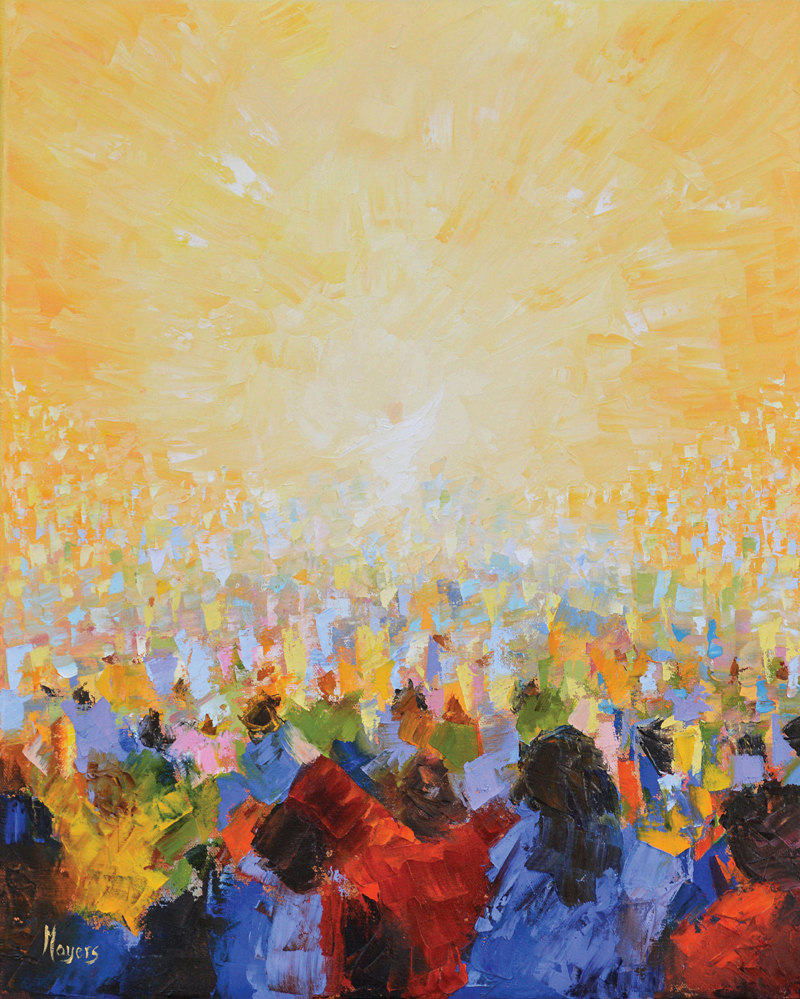 |
| Hallelujah - Mike Moyers |
Holy Week begins today. Normally the choir and the children would process into the sanctuary waving palms as we sang “King of Kings, Lord of Lords” This year Holy Week looks very different. We didn’t have a palm procession, though we did sing “All Glory, Laud, and Honor.” As Holy Week begins, we won’t be gathering in person to observe Maundy Thursday, Good Friday, or Easter. There will be a variety of online opportunities, but Holy Week will be different this year as we gather as the virtual body of Christ.
The reading from Philippians 2 doesn’t speak of the Triumphal Entry that marks Palm Sunday, but it does take us on the way of obedience that moves from glory to glory. However, this path of obedience involves Jesus emptying himself of his divine stature so that he might become a human being and experience death on a cross. Thankfully the hymn doesn’t end with Jesus hanging on the cross. It goes on to celebrate God’s vindication of Jesus.
While Paul doesn’t mention Palm Sunday, Amy Plantinga Pauw links this hymn with Palm Sunday. She suggests that “Christ’s triumphal entry into Jerusalem points ahead of itself to his death, when the subversive character of his kingship is definitively revealed” [Feasting on the Word, p. 172].
When Paul wrote his letter to the Philippian church, he was sitting in a Roman jail. He seems to have heard that this congregation was experiencing conflict, so he used this hymn to call them back to a unity of love and purpose. He used the hymn to point to Jesus, asking them to be like Jesus, who “though he was in the form of God, did not regard equality with God as something to be exploited.” Instead, Jesus emptied himself of his divine prerogatives and became a servant to others. Yes, be like Jesus.
This hymn is full of theological concepts that beg to be unpacked. If we had time we could go line by line, but that’s for another day. Right now we’re in the middle of a crisis. The question is, as we enter Holy Week, what does this ancient hymn say to us? How might we have the mind of Christ at this moment?
As I pondered the hymn’s witness to Jesus’ identity, I couldn’t help but think of all the people putting their lives on the line during this pandemic. I’m thinking about all the medical personnel at our hospitals—doctors, nurses, orderlies, lab technicians, kitchen staff, and many more. We’re hearing that some of these dedicated servants are getting sick and some are even dying as they serve the needs of others. I’m also thinking of first responders—the EMTs, the firefighters, the police, and the national guard, all of whom are helping those in need. I can’t forget the grocery workers, like my brother, who day-in and day-out go to work so we have access to food and other goods. Then there are all the workers who are making personal protective gear, ventilators, and other essentials. They’re also putting themselves on the line. I was also reminded recently of the farmworkers who are going into the fields to provide us with fresh produce. These are just some of the people who are following the way of obedience in service to others so that the rest of us can shelter-in-place. By doing this, we’re doing our part to flatten the curve so that at some point we can move out of this moment of crisis.
The first half of the hymn speaks of humility and service, while the second half points beyond the cross to the resurrection and the ultimate exaltation of Jesus. In this second half of the hymn we hear a word of expectation and hope.
Earlier in this message, I shared Amy Plantinga Pauw’s word about the subversive nature of Palm Sunday, which pointed us toward the cross. She also speaks of the witness of Palm Sunday to the post-Easter vindication of Jesus:
The procession of Palm Sunday points ahead of itself to that ultimate triumphant procession, in which every knee shall bow and every tongue shall confess Jesus Christ as Lord (v. 10-11). This procession will not be like the uncomprehending clamor of the crowd at Jerusalem; nor will it be an exclusive, winners-only celebration like the Super Bowl Motorcade. [Feasting on the Word, p. 174].
If we share in Christ’s obedience to the way of service to others, then we will share in the blessings of the Resurrection. We still have to move through the realities of Good Friday, but that will not be the final word. We may be getting ready to walk with Jesus to Golgotha, but I believe that right now we need to take hold of the hymn’s message of hope. We still have to sing “Were you there when they crucified my Lord?” But after we watch them lay Jesus in the tomb, we can boldly sing “Crown Him with Many Crowns” even as we bend our knee and confess that “Jesus Christ is Lord, to the glory of God the Father.”
May we live this day and the coming days with this confession on our lips, as we walk together along the way of obedience in service to others, even if that way of service means staying home and staying safe so that the virus can be defeated.
Preached by:
Dr. Robert D. Cornwall, Pastor
Central Woodward Christian Church (Disciples of Christ)
Troy, Michigan
April 5, 2020
Palm/Passion Sunday
Image attribution: Moyers, Mike. Hallelujah, from Art in the Christian Tradition, a project of the Vanderbilt Divinity Library, Nashville, TN. http://diglib.library.vanderbilt.edu/act-imagelink.pl?RC=57147 [retrieved April 4, 2020]. Original source: Mike Moyers, https://www.mikemoyersfineart.com/.
Image attribution: Moyers, Mike. Hallelujah, from Art in the Christian Tradition, a project of the Vanderbilt Divinity Library, Nashville, TN. http://diglib.library.vanderbilt.edu/act-imagelink.pl?RC=57147 [retrieved April 4, 2020]. Original source: Mike Moyers, https://www.mikemoyersfineart.com/.
Comments